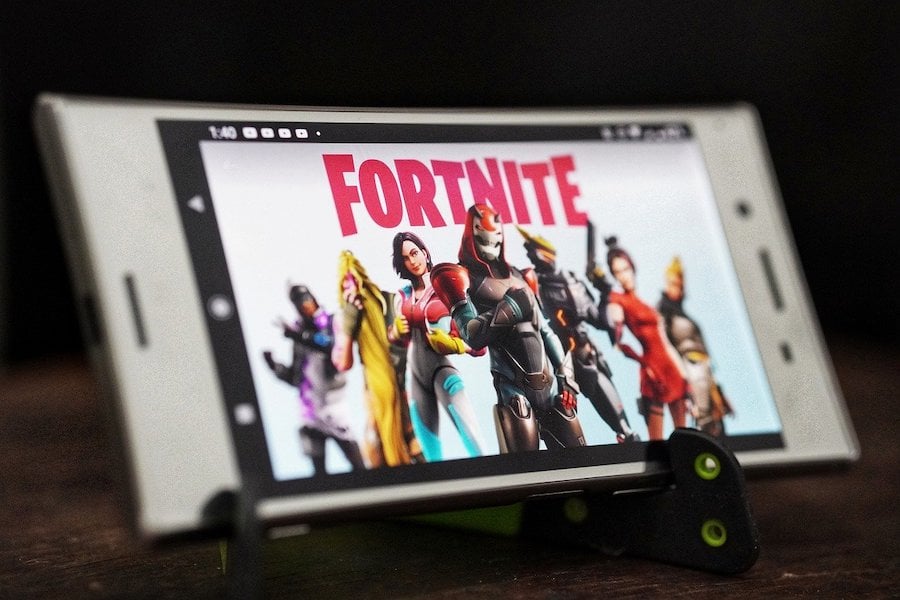OAKLAND, Calif. (CN) — Epic Games cannot force Apple to reinstate its popular "Fortnite" game on the Apple app store because it chose to breach a contract instead of maintaining the status quo while its antitrust suit against the tech giant moves forward, a federal judge said Monday.
“In my view you cannot have irreparable harm when you create a harm yourself,” U.S. District Judge Yvonne Gonzalez Rogers said during a virtual court hearing Monday.
Epic Games sued Apple and Google on Aug. 13 after the tech companies kicked the video game off their app stores due to an ongoing dispute over commissions. The dispute started when Epic Games introduced a “hotfix” to its game allowing users to pay it directly for in-app purchases instead of going through Apple, which earns a 30% commission on all app payments.
During a hearing on a motion for a temporary restraining order Monday, Gonzalez Rogers suggested Apple’s conduct may be anticompetitive but she rebuked Epic Games for choosing to take a confrontational approach instead of merely suing Apple and seeking monetary damages for the commission payments.
“All Epic has to do is remove the hotfix, go back to the status quo and nobody suffers harm,” Gonzalez Rogers said.
However, the judge said she was inclined to stop Apple from restricting another Epic Games app in retaliation for its conduct. Apple blocked Unreal Engine, a game engine used by third-party developers to create games, which is distributed by a subsidiary of Epic Games and operates under a separate licensing agreement with Apple.
Gonzalez-Rogers said Apple may have gone too far in blocking Unreal Engine because that app did nothing to violate the terms of its contract.
“Apple has moved beyond its one contract with Epic Games and is using its hard leverage and has slammed Epic Games with this additional penalty,” Gonzalez Rogers said. “It does to me look retaliatory.”
Insisting that a temporary restraining order against Apple would be in the public interest, Epic Games attorney Katherine Forrest of Cravath Swaine and Moore argued that "Fortnite" is more than just a game; it’s a social environment that users depend on to connect with people around the globe, she said.
During a pandemic, “these kinds of social connections become incredibly important,” Forrest told the judge.
Apple users won’t be able to access "Fortnite" after Aug. 28 when a new “season” of the game starts, which will require an update through the app store.
Gonzalez Rogers told Forrest that her client “strategically in a calculated move” decided to breach its contract with Apple right before a new season was set to start.
Forrest also argued that Epic Games is suffering reputational damage and harm to its goodwill as a result of Apple pulling its game from the app store. She said Epic is receiving “loads of customer complaints” about the situation.
Gonzalez Rogers was unsympathetic, noting that Epic Games chose to sneak in code for its own payment system in a “hotfix” for the game without first disclosing it to Apple.
“Your client created the situation,” Gonzalez Rogers said. “Your client doesn’t come to this court with clean hands.”
Forrest argued that multiple Supreme Court cases establish that one need not comply with contractual obligations that violate antitrust laws. Gonzalez Rogers refused to consider those cases because they were not cited in written arguments.
When the judge asked if there was any reason why Epic Games could not undo its bypass of Apple’s payment system for in-app purchases, Forrest acknowledged there is no technical barrier to switching back. However, she suggested it would be unconscionable to return to a situation where her client submits to Apple’s allegedly monopolistic conduct.
“We can’t just flip a switch and go back into an anticompetitive contract,” Forrest said. “The court would be asking us to engage in the scheme with Apple that provides for the anticompetitive kinds of lack of competition.”
Epic Games is only seeking injunctive relief, not monetary damages, to make Apple stop requiring 30% commissions for in-app purchases.
Gonzalez Rogers issued an eight-page ruling late Monday night refusing to make Apple reinstate "Fortnite" on its app store but also blocking Apple from restricting other apps by Epic Games’ affiliates on its app store.
The judge also scheduled a preliminary injunction hearing for Sept. 28.
Attorneys for Apple and Epic Games said they would move quickly to prepare for a bench trial within six to eight months.
Apple’s payment policy has been at the center of a slew of lawsuits from app developers claiming the tech giant is using its app store to exert monopolistic power over the market. Last year, the Supreme Court advanced a consumer class action claiming Apple exerts monopoly power to make consumers pay more for apps than they would in a more competitive marketplace.
Subscribe to Closing Arguments
Sign up for new weekly newsletter Closing Arguments to get the latest about ongoing trials, major litigation and hot cases and rulings in courthouses around the U.S. and the world.









